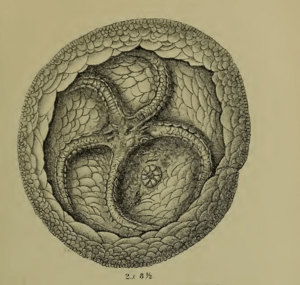Edwin Tulley Newton facts for kids
Edwin Tulley Newton (born May 4, 1840 – died January 28, 1930) was a famous British scientist who studied fossils. Scientists who study fossils are called paleontologists. Newton helped us learn a lot about ancient life on Earth.
Early Life and Learning
Edwin Newton started his career working with his hands, doing handicrafts. But he was very interested in science. He got a chance to attend special talks given by a very important scientist named Thomas Henry Huxley. Huxley was a famous biologist who supported Charles Darwin's ideas.
In 1865, because of his hard work and talent, Edwin Newton became Thomas Henry Huxley's assistant. This was a big step for him into the world of science!
Working with Fossils
In 1882, Edwin Newton became the main paleontologist for the "Geologic Survey." This was a big job where he helped map and understand the Earth's history through rocks and fossils. He kept this important position until 1905.
His early work was quite interesting. He used microscopes to study very thin slices of coal. He also did detailed studies on the brains of cockroaches! Later, he focused on chimaeroid fish fossils. These are fossils of ancient fish that are related to sharks and rays.
Awards and Leadership
Edwin Newton was recognized for his important contributions to science. In 1893, he won the Lyell Medal. This is a special award given by the Geological Society of London for excellent work in geology.
He also took on leadership roles in important scientific groups. He was the president of the Geologists' Association from 1896 to 1898. Later, he led the Palaeontographical Society as its president from 1921 to 1928. These roles show how much other scientists respected his knowledge and leadership.
Honored Scientist
Edwin Newton was elected as a "Fellow" of several important scientific societies. Being a Fellow means you are a recognized expert in your field. He became a Fellow of the Geological Society of London in 1873, the Zoological Society of London (which studies animals) in 1885, and the prestigious Royal Society in 1893. These honors highlight his significant impact on the study of fossils and natural history.
 | Roy Wilkins |
 | John Lewis |
 | Linda Carol Brown |


